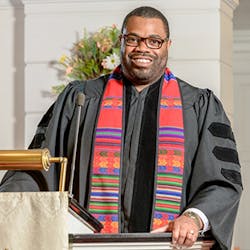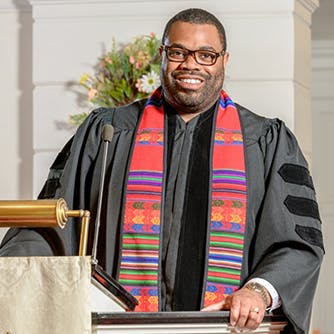Answering The Call
6 min read

Navigating Seasons of Change

by Michael L. Sloan
First Congregational Church of Spencerport, New York
It was Tuesday, September 24, 2024. The chair of the finance committee, along with two others, had requested to meet with me in my office. I had just returned to work from a three-month sabbatical. I knew the meeting was about my compensation package; but I did not know the details thereof. In the meeting, the chair of the finance committee explained to me that for financial reasons the church needed to reduce my medical insurance from Plan A to Plan C. With a 24-year-old daughter who had moved back home a year prior and a wife that was pregnant with twins, I was hit with several different emotions. Plan A was obviously the preferred choice because there was only a $600 annual deductible. With Plan C there was a $3,000 annual deductible. That is a $2,400 difference. The interesting thing about insurance is this: it is the one thing that we all need, but hope we never have to use.
After the meeting, my family and I contemplated for weeks which route to take to ensure that we were protected in case of a medical emergency. After weeks of deliberating and praying, we decided that there was no other option but to accept Plan C. However, we decided that we would take advantage of the Pension Boards’ Flexible Spending Account option that allows up to $3,300 (pre-tax) to be set aside for medical-related expenses. This means that $137.50 would be automatically deducted from each paycheck and placed in an account for medical expenses. These were not at all easy decisions to make, but they had to be made, nonetheless.
Clergy all over the country may be facing similar scenarios, or even more complex problems such as declining church attendance and donations needed to support full-time clergy and other staff members. These seasons of change are just like the bitter-cold winter months—ready or not, they will come—and we just have to prepare for them the best we can. For clergy going through seasons of change in their compensation, it is imperative to think about alternative options.
Navigating Compensation through Two-Point Charges
First, consider talking to your council about a two-point charge with another church within a reasonable distance from your current congregation. If this works out, one church can pay for your insurance and the other one can pay your cash salary. I have come across situations where a minister has a two-point charge, and one church pays the cash salary, and the other church offers a parsonage. There are many ways to get creative with two-point charges.
Maximizing Church Space When Funds Are Low
Next, most churches don’t realize that they are sitting on a gold mine. There are countless churches across the country that only use about 10% of their building space. When funds are low, churches can resurrect their entrepreneurial efforts and begin to share space with other non-profit organizations. The First Congregational Church in Memphis, Tennessee, is a great example. One-third of their budget comes from sharing space with other organizations. When I visited the church two years ago, the third level of the church was dedicated to office space for non-profit organizations. They also had a bike repair shop, and a hostel attached to the church.
I strongly encourage clergy and congregations to begin getting creative. Share space. Space can be shared with home-school organizations, before-and-after school programs, licensed therapists, freelance writers, etc. The ideas listed here are only the tip of the iceberg. Dig deep, you never know what you will come up with.
Creating A Safe Space for Mental Health
Additionally, within seasons of change, there is a great deal of stress that can sometimes feel relentless. It is imperative for clergy to have safe spaces to share their concerns, their anxieties, and their fears about the future. I want to pause here and ask: Where is your safe space? Is it with a pastoral counselor? A licensed therapist? Is it with a parent? A ministry colleague? Clergy groups? Where is it? It is paramount for all clergy to have safe spaces. After dealing with the complexities of change in my compensation package, I found a safe space in four areas: 1) ministry colleagues; 2) silence and solitude; 3) reading a good book; and 4) my in-laws. By taking advantage of these safe spaces, I was better able to manage stress and anxiety.
Finally, as I stated above, seasons of change are just like the bitter-cold winter months—ready or not—they will come. Sometimes you can see these changes coming a mile ahead. Other times, change simply creeps up on you and catches you off-guard. Regardless, it is imperative that in seasons of change, clergy be prepared both economically and emotionally.
Get help with self-care practices
If you are a Pension Boards member, you can speak with a Licensed Professional Counselor or Work/Life Specialist at no cost to you through the Member Assistance Program offered by Health Advocate. Through in-person visits, or confidential phone consultations, these specialists can walk you through job stress, depression, work/life balance, and more. Call 1.877.240.6863.

by The Rev. Dr. Michael L. Sloan
The Rev. Dr. Michael L. Sloan has served as Senior Minister of First Congregational Church of Spencerport, New York, since February of 2019. He also serves as President of Spencerport Ecumenical Ministries, as a Committee Member of the Genesee Valley Association’s Committee on Church & Ministry, and as a Board Member of the New York Conference.
Be open to the leading of the One who is accompanying you through this, and in all, of your journeys.Rev. Dr. Martha M. Cruz
RELATED ARTICLES
Snow Day Slowdown
Stretch Your Hard-Earned Dollars: Benefits to a Flexible Spending Account
POPULAR RESOURCES
Generations: A Journal of Faith and Finance - Cultivating Resilience and Self-Care in a Multi-Vocational World
Cultivating Resilience and Self-Care in a Multi-Vocational World
